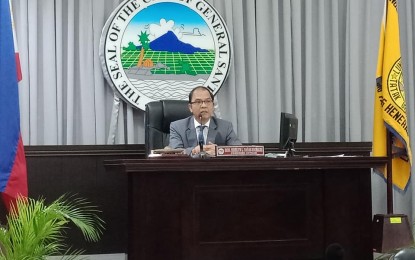
PROBE. The committee on transportation of the General Santos City Council has launched a legislative inquiry into the alleged anomalies in the implementation of the public transport modernization program in the city. City Councilor Franklin Gacal Jr. (in photo), committee chair, says the inquiry was based on a request submitted by at least 10 transport groups led by GenSan Transportworkers Alliance, the local chapter of the National Confederation of Transportworkers Union. (Photo lifted from Councilor Gacal’s Facebook page)
GENERAL SANTOS CITY -- The City Council has launched a legislative inquiry into the alleged anomalies in the implementation of the public transport modernization program and the traffic and transport management system here.
City Councilor Franklin Gacal Jr., chair of the council’s committee on transportation, said the move was based on a request submitted last month by at least 10 transport groups led by GenSan Transportworkers Alliance (GTA), the local chapter of the National Confederation of Transportworkers Union (NCTU).
Gacal said the groups asked his committee to investigate supposed “anomalies in the public transport operations in the city.”
“We will look into the allegations and determine how the committee and the council can intervene,” he said before the start of the inquiry on Tuesday afternoon.
In a letter dated Nov. 13 addressed to Gacal, the complainants claimed that the alleged anomalies involved “well-established transport organizations, LTFRB (Land Transportation Franchising and Regulatory Board) and LTO (Land Transportation Office).”
It said the GTA has been opposing the implementation of the national government’s public transport modernization program due to the lack of “clear just transition” for the effected drivers and operators and protection of franchise holders with existing routes.
They accused some established local transport organizations of “conniving with some unscrupulous LTFRB personnel in hijacking the routes of other franchising holders by allowing other transport cooperatives to operate.”
GTA cited the case of the Doña Soledad Drivers Operators (DSDO) Transport Cooperative, which was allegedly undermined by the Lagao Drivers Operators Transport Cooperative (LADOTRANSCO), with assistance from LTFRB and LTO.
LADOTRANSCO, led by Robert Cang, currently operates on the same route.
It said DSDO, which has existing franchises up to 2022, were not issued by the LTFRB with electronic confirmation, which is a requirement for the renewal of vehicle registration with the LTO.
GTA said LADOTRANSCO and another group, Metro GenSan Transport Cooperative led by Orly Sabelita, were also “bulldozing other franchise holders in some other routes.”
It urged Gacal’s committee to look into “whether there was money involved” in the supposed connivance between the major transport groups and concerned government agencies.
Cang denied the accusations and maintained that their operations only covered the routes approved by the LTFRB and the city government, based on the Local Public Transport Route Plan.
“We have properly complied with the requirements set under the public transport modernization program,” he said.
In an interview, LTFRB-12 director Renato Padua said there was no irregularity with the implementation of the modernization program in the area, adding the agency has been fair in dealing with transport organizations.
Padua said any transport group may take part in the modernization program, provided that they undergo the processes and properly comply with its requirements.
Padua said the program requires transport groups to consolidate as one entity to rationalize local public transportation systems.
“The franchise and the routes are provided by the government so that’s a privilege for them,” he said. (PNA)
